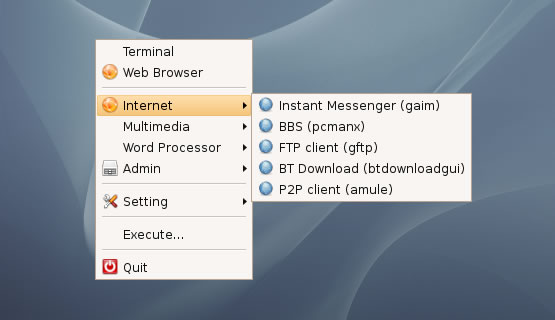I’ve been thinking about reviewing a few Linux distributions for a while now and while browsing around DistroWatch, noticed a shifty looking project called PUD GNU/Linux.

PUD is a Chinese distro based on Ubuntu 7.04 (Feisty) and the 2.6.20 kernel. They’ve patched in several filesystems and through using SquashFS for the loader filesystem, the ISO is a mere 193megs.
I was going to do the full test of PUD on my ancient laptop (PIII 1gHz, 256megs of ram) but there was one problem: WiFi drivers. The PCMCIA card that does this is supported natively in Ubuntu — since 6.10 — but try as I might, nothing could get a response out of it in. So to cut a long story short, I’ve been testing this on a 3gHz P4 with 768megs of RAM.
My initial reaction to loading was “damn this is fast” — not just on the desktop but also the much older laptop. BIOS to desktop in 1m23s. Some LiveCDs take that long just to display the opening menu! Most of this is down to how much they’ve stripped out of Ubuntu (namely Gnome) and have replaced it with the really quite excellent XFCE.
As I’ve already said, PUD is based on Ubuntu — a Gnome based OS… Why didn’t they go with Xubuntu?
Out the box software
That’s my main bugbear with PUD. I know it’s hypocrisy to expect a 193meg distribution to give you a thoroughly good rogering, put you to bed and call you again the next morning. The presentation isn’t ideal either, with many of the applications sharing icons in the menu:

PUD comes with the following GUI-based applications:
- Internet
- Firefox using the Orbit Grey Custom theme and the following plug-ins:
- All-in-one Gestures
- FasterFox
- FlashGot
- Gmail Space
- Tab Mix Plus
- Video Downloader
- pcmanx
- gftp
- btdownloadgui
- amule
- Firefox using the Orbit Grey Custom theme and the following plug-ins:
- Multimedia
- VLC Player
- beep-media-player
- gqview
- Word Processor
- gvim
- leafpad
- epdfview
- xchm
I wouldn’t normally list all the software, but seeing as it’s a tiny little list like that, I couldn’t see the harm.
The point I’m trying to make here is you don’t get too much to play with. The configuration applets are, in true XFCE style, lightweight but underpowered. As I said earlier, getting Ubuntu to find my Laptop’s WiFi and connect to the network was 2 clicks of effort. XFCE made it 50 clicks, a lot of typing and no result.
They’ve also localised the whole thing to Chinese and thought this sounds like it might cause you a lot of issues, the system does go some distance to detect what you’re on and give you English… The one problem is they haven’t gone the whole way.

Smotherings of applications and libraries (including Perl) are broken because they can’t decide what language to use and while I’m sure this could be fixed, it’s certainly not pretty.
For Windows users?
While fairly similar to Windows, XFCE is just slightly too raw for your average Windows user. They certainly wouldn’t have a clue about setting it up and getting things installed considering that your only option for that on PUD is via the command line.
PUD did find the NTFS partition on the desktop without issue and I was able to pull things off it and beam them across the network via SMB.
In conclusion…
PUD is possibly the fastest LiveCD I’ve used but it isn’t for many people. It doesn’t have the applications built onto it to be useful to technicians (to debug hardware, etc) and the same reason again for it not being useful to your average end consumer.
The only real use I could see for PUD is sticking it on a really low end piece of hardware and using it as an internet kiosk. For that, it would do splendidly because it is so light.
I fear many of the usability issues are not a complaint with the PUD project, rather XFCE. It is simple. It is lightweight but it has to go another few miles before it attains the usable status that KDE and Gnome work so hard for.
You should remember that is is tiny and a sub-200meg release like this is amazing for what it does include but that just doesn’t cut the cream for any kind of general purpose computing.